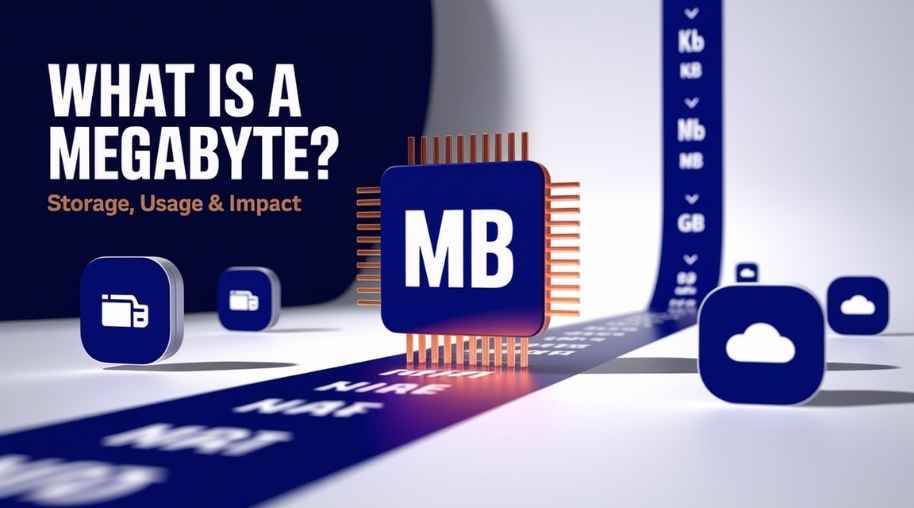MB Full Form-Mega byte
by Shashi Gaherwar
0 2671
Megabyte (MB): Definition, Usage, and Importance in Digital Storage
Introduction
In the digital world, data is measured in various units, and one of the most commonly used is the megabyte (MB). Whether you’re downloading a file, checking storage space on your device, or streaming content, understanding megabytes helps in managing data efficiently. This article explores what a megabyte is, how it compares to other data units, and its significance in digital storage and computing.

What is a Megabyte (MB)?
A megabyte (MB) is a unit of digital information storage equal to 1,024 kilobytes (KB) or 1,048,576 bytes (B). It is widely used to measure file sizes, storage capacity, and data transfer rates in computers and digital devices.
Conversion Breakdown:
- 1 Megabyte (MB) = 1,024 Kilobytes (KB)
- 1 MB = 1,048,576 Bytes (B)
- 1 MB = 8,388,608 Bits (b)
While MB is commonly used, larger and smaller units such as gigabytes (GB), terabytes (TB), kilobytes (KB), and bytes (B) are also essential in digital storage.
Megabyte vs Other Data Units
Understanding how a megabyte compares to other digital storage units is crucial when dealing with files, storage devices, and network bandwidth.
- Byte (B): Smallest unit of digital data
- Kilobyte (KB): 1,024 Bytes
- Megabyte (MB): 1,024 KB (1,048,576 Bytes)
- Gigabyte (GB): 1,024 MB
- Terabyte (TB): 1,024 GB
For example, a typical MP3 song might be around 5 MB, while a high-definition (HD) movie file could be 2-5 GB in size.
How is a Megabyte Used?
The megabyte is used in various aspects of digital computing and data storage. Here are some common applications:
- File Sizes: Most common file types are measured in MB, such as:
- A high-resolution image: 2-5 MB
- A typical MP3 audio file: 3-5 MB
- A PDF document: 1-10 MB, depending on images and content
- Storage Devices: Storage capacity is often expressed in MB, GB, or TB. Examples include:
- USB flash drives: 256 MB to 1 TB
- Smartphones: 16 GB to 512 GB (1 GB = 1,024 MB)
- External hard drives: 500 GB to 8 TB
- Internet and Data Transfer:
- Download and Upload Speeds: Internet speeds are often measured in megabits per second (Mbps), where 1 MB = 8 megabits (Mb).
- Streaming: Video streaming quality is impacted by data usage, such as:
- Standard Definition (SD): ~700 MB per hour
- High Definition (HD): ~3 GB per hour
- Software and Applications: Many applications and software updates are measured in MB.
- Mobile apps range from a few MBs to hundreds of MBs, depending on functionality.
- Operating system updates often require several MBs to multiple GBs.
Importance of the Megabyte in Computing
- Efficient Data Management: Understanding MBs helps users manage their storage better, preventing issues like running out of space or exceeding data limits.
- Faster Decision Making: When downloading files or sending attachments via email, knowing the MB size ensures smooth operations without exceeding file limits.
- Optimizing Internet Usage: Users can control their data consumption by monitoring MB usage, especially when on limited data plans.
- Impact on Business and IT Infrastructure: For businesses, MB-sized files impact server storage, cloud computing, and network performance. Efficient data management strategies help optimize resources.
Future of Megabyte Usage
While the megabyte is still widely used, the rapid growth of technology is shifting storage and data measurements toward gigabytes, terabytes, and even petabytes. However, MBs remain a crucial unit for everyday computing tasks, mobile applications, and network management.
A megabyte (MB) is a fundamental unit of digital data storage, playing a crucial role in everyday computing, file management, and internet usage. Whether dealing with files, streaming content, or understanding storage devices, knowing what a megabyte is and how it relates to other units ensures better data management and efficiency in the digital age.
Further Learning Resources
If you’re passionate about building a successful blogging website, check out this helpful guide at Coding Tag – How to Start a Successful Blog. It offers practical steps and expert tips to kickstart your blogging journey!
For dedicated UPSC exam preparation, we highly recommend visiting www.iasmania.com. It offers well-structured resources, current affairs, and subject-wise notes tailored specifically for aspirants. Start your journey today!

Share:









Comments
Waiting for your comments